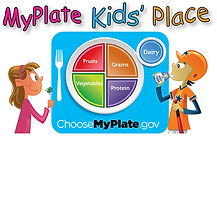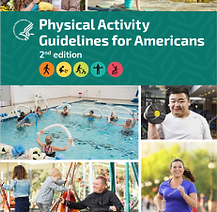Cathy Dyer
RDN, NBC-HWC
Get Educated
evidence-based scientifically sound resources
cut through the noise, skip the fads, ignore the food hysteria in the media,
and dismiss the conflicting information found on the internet
(click the images to access the documents)
USDA Dietary Guidelines - read online or download for free
The U.S. Department of Health and Human Services (HHS) and the U.S. Department of Agriculture (USDA) jointly publish the Dietary Guidelines for Americans (Dietary Guidelines) every 5 years. Each edition of the Dietary Guidelines reflects the body of nutrition science.
What we eat and drink is important at every stage of life, and it is never too early or too late to eat healthfully. The purpose of the Dietary Guidelines for Americans is to provide advice on what to eat and drink to build a healthy diet that can promote healthy growth and development, help prevent diet-related chronic disease, and meet nutrient needs.
MyPlate for Preschoolers and Kids - completely free from the USDA
Preschoolers: a great resource for parents and teachers, including customizable growth charts and food group information, tips for picky eaters, food safety for preschoolers, and more.
Kids: a great resource for kids, parents, and teachers. Resources include games, activity sheets, kid-friendly recipes, and physical activity tips. Kids can also pledge to become MyPlate Champions.
Harvard Healthy Eating Plate
So, not everyone agrees with the USDA MyPlate. And by not everyone, I mean Harvard.
The Healthy Eating Plate was created by Harvard Health Publishing and nutrition experts at the Harvard School of Public Health. It offers more specific and more accurate recommendations for following a healthy diet than MyPlate, developed by the U.S. Department of Agriculture and the Department of Health and Human Service. In addition, the Healthy Eating Plate is based on the most up-to-date nutrition research, and it is not influenced by the food industry or agriculture policy.
Dietary Reference Intakes - purchase paperback or download free pdf
How much does your child, and you, need of.... well....everything?
Widely regarded as the classic reference work for the nutrition, dietetic, and allied health professions since its introduction in 1943, Recommended Dietary Allowances has been the accepted source in nutrient allowances for healthy people. Responding to the expansion of scientific knowledge about the roles of nutrients in human health, the Food and Nutrition Board of the Institute of Medicine, in partnership with Health Canada, has updated what used to be known as Recommended Dietary Allowances (RDAs) and renamed their new approach to these guidelines Dietary Reference Intakes (DRIs).
Expert Committee Recommendations Regarding the Prevention, Assessment, and Treatment of Childhood and Adolescent Overweight and Obesity: Summary Report - download free pdf
Barlow SE and the Expert Committee. Expert Committee Recommendations Regarding the Prevention, Assessment, and Treatment of Childhood and Adolescent Overweight and Obesity: Summary Report. Pediatrics. 2007;120(3):s164-S192.
Weight control interventions are suggested for children and adolescents with excess weight. Along with specific eating and physical activity behavior counseling, the use of parent-centered counseling techniques, such as motivational interviewing to help families identify their own motivation for making change, is recommended. Four stages of care are recommended and explained. The importance of parent participation in their child's weight control program is stressed throughout.
Prevention of Pediatric Overweight and Obesity Policy Statement - download free pdf
Committee on Nutrition of the American Academy of Pediatrics. Policy Statement: Prevention of Pediatric Overweight and Obesity. (2003). Pediatrics, 112(2), 424-430. doi:10.1542/peds.112.2.424
The AAP concludes that families should be educated and empowered to recognize the impact they have on their child's development of lifelong habits of physical activity and nutritious eating. Dietary practices should be fostered that encourage moderation rather than overconsumption, emphasizing healthful choices rather than restrictive eating patterns. Parents should be empowered to promote children’s ability to self-regulate energy intake while providing appropriate structure and boundaries around eating.
Preventing Obesity and Eating Disorders in Adolescents - download free pdf
Neville H. Golden, MD, FAAP, Marcie Schneider, MD, FAAP, Christine Wood, MD, FAAP, COMMITTEE ON NUTRITION, COMMITTEE ON ADOLESCENCE, SECTION ON OBESITY; Pediatrics, September 2016, VOLUME 138/ISSUE 3, From the American Academy of Pediatrics, Clinical Report
Should your teen be "dieting"? Does eating meals as a family make a difference in weight? What effect does making comments or teasing about weight have on your teenager? What are the current and future chronic disease risks faced by obese teens?
The AAP says an integrated approach to obesity and eating disorder prevention focuses less on weight and more on healthy family-based lifestyle modification that can be sustained.
Policy Statement / Fruit Juice in Infants, Children, and Adolescents: Current Recommendation - download free pdf
Heyman MB, Abrams SA, AAP SECTION ON GASTROENTEROLOGY, HEPATOLOGY, AND NUTRITION, AAP COMMITTEE ON NUTRITION. Fruit Juice in Infants, Children, and Adolescents: Current Recommendations. Pediatrics. 2017;139(6):e20170967
“Parents may perceive fruit juice as healthy, but it is not a good substitute for fresh fruit and just packs in more sugar and calories,” said Melvin B. Heyman, MD, FAAP, co-author of the statement. “Small amounts in moderation are fine for older kids, but are absolutely unnecessary for children under 1.”
The new recommendations state that 100-percent fresh or reconstituted fruit juice can be a healthy part of the diet of children older than 1 year when consumed as part of a well-balanced diet. Consumption, however, should be limited depending on a child’s age.
Role of Health Coaches in Pediatric Weight Management: Patient and Parent Perspectives - download free pdf
Rice, K. G., Jumamil, R. B., Jabour, S. M., & Cheng, J. K. (2017). Role of Health Coaches in Pediatric Weight Management: Patient and Parent Perspectives. Clinical Pediatrics, 56(2), 162–170. https://doi.org/10.1177/0009922816645515
Through a collaborative partnership, a health coach helps patients identify their personal health goals and acquire the knowledge, resources, and self-efficacy to achieve them. The researchers conclude that families' specific needs should be holistically considered in the design of health coaching programs targeting pediatric obesity.
Motivational Interviewing for Pediatric Obesity: Conceptual Issues and Evidence Review
Resnicow K, Davis R, Rollnick S, et al. Motivational Interviewing for Pediatric Obesity: Conceptual issues and evidence review. J Am Diet Assoc. 2006;106:2024-2033.
An older, but foundational article explaining how motivational interviewing helps parents and children change behaviors leading to obesity. Motivational interviewing, as used by a nutrition coach, assumes that behavior change is affected more by motivation than information.
If Your Child Is Overweight - A Guide For Parents
by Susan M. Kosharek, MS, RDN - purchase on Amazon or through eatright.org
Kosharek, S. M. (2016). If your child is overweight: A guide for parents (Fourth ed.). Chicago, IL: Academy of Nutrition and Dietetics.
Family-focused and easy to follow, this updated edition provides guidance for parents of children ages 4 to 12. Parents will learn practical tips and strategies for improving the eating and activity habits of the whole family.
Fearless Feeding: How to Raise Healthy Eaters From High Chair to High School
by Jill Castle, MS, RD and Maryann Jacobsen, RD - purchase on Amazon
Castle, J., & Jacobsen, M. (2018). Fearless feeding: How to raise healthy eaters from high chair to high school. Fearless Feeding Press.
From deciding when to introduce solids to helping vegetarian teens make healthy choices, parents confront many issues when trying to get their children to eat healthy meals. This comprehensive book by Jill Castle and Maryann Jacobsen ― both pediatric and family nutrition experts ― explains how eating relates to a child's overall development, how to make balanced food choices (and help children make them too), and how to end feeding struggles forever.
Castle and Jacobsen outline an inclusive approach to healthy feeding centered around the three Fearless Feeding Fundamentals: WHAT, HOW, and WHY. This newly updated and revised edition of Fearless Feeding explores feeding children at every stage of development in order to maximize health and growth and prevent unhealthy attitudes about food later in life.
Your Child's Weight: Helping Without Harming
by Ellyn Satter, MS, RD, LCSW, BCD - purchase on Amazon
Satter, E. (2005). Your childs weight: Helping without harming: Birth through adolescence. Madison, WI: Kelcy Press.
Renowned childhood feeding expert Ellyn Satter considers the overweight child issue in a new way. Combining scientific research with inspiring anecdotes from her decades of clinical practice, Satter challenges the conventional belief that parents must get overweight children to eat less and exercise more. In the long run, she says, making them go hungry and forcing them to be active makes children preoccupied with food, prone to overeating, turned off to activity, and likely to gain too much weight. Trust is a central theme here: children must be able to trust parents to provide as much food as they need to satisfy their appetites; parents must trust children to eat only as much as they need. Satter provides compelling evidence that, if parents do their jobs with respect to feeding, children are remarkably capable of knowing how much to eat.
Physical Activity Guidelines for Americans - free download
How much and what kind of physical activities are recommended for your child, and you?
Published by the US Office of Disease Prevention and Health Promotion, the PAG includes recommendations for Americans ages 3 years and over — including people at increased risk of chronic disease — and provides evidence-based advice on how physical activity can help promote health and reduce the risk of chronic disease.
Position Stand: Appropriate Physical Activity Intervention Strategies for Weight Loss and Prevention of Weight Regain for Adults - free download
DONNELLY, JOSEPH E. Ed.D (Chair); BLAIR, STEVEN N. PED; JAKICIC, JOHN M. Ph.D.; MANORE, MELINDA M. Ph.D., R.D.; RANKIN, JANET W. Ph.D.; SMITH, BRYAN K. Ph.D., Medicine & Science in Sports & Exercise: February 2009 - Volume 41 - Issue 2 - p 459-471
doi: 10.1249/MSS.0b013e3181949333
SPECIAL COMMUNICATIONS: Position Stand
Evidence supports moderate-intensity PA between 150 and 250 minutes per week to be effective to prevent weight gain. Moderate-intensity PA between 150 and 250 minutes per week will provide only modest weight loss. Greater amounts of PA (>250 min/wk) have been associated with clinically significant weight loss. Moderate-intensity PA between 150 and 250 minutes per week improved weight loss in studies that used moderate diet restriction but not severe diet restriction.
The Protein Myth, American Chemical Society - free download
Provided by the ACS through their April/May 2018 edition of ChemMatters, an online magazine. Written specifically for teenagers, but educational for all. They also provide a free downloadable teacher's guide.
Some research shows that consuming too much protein can overload the kidneys, contribute to metabolic disease, and especially in women lead to an increased risk of bone fractures.
Are Vitamin Supplements Necessary?, American Chemical Society - download free pdf
Provided by the ACS through their Dec 2017/Jan 2018 edition of ChemMatters, an online magazine.
Medical research does not seem to find any benefit in taking daily vitamin supplements. According to the federal government’s 2015–2020 Dietary Guidelines for Americans, “nutritional needs should be met primarily from foods."
Comparison of Weight-Loss Diets with Different Compositions of Fat, Protein, and Carbohydrates - download free pdf
The New England Journal of Medicine, Feb 26, 2009, Vol. 360 No. 9
There are about as many diet books, plans, programs, and systems as there are stars in the sky: low-carb, low-fat, high-fat, high-protein, blah, blah, blah.......which diet actually leads to weight loss? The one where you (1) burn more calories than you eat, and (2) stick with it long enough to lose weight. The End



.jpg)












